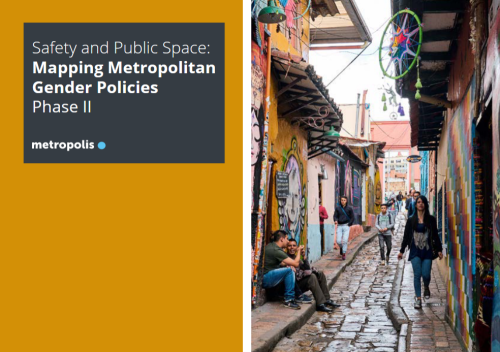Safety and Public Space: Mapping Metropolitan Gender Policies Phase II
Violence against women and girls is a human rights violation. Its immediate and long-term impact has multiple physical, sexual and psychological consequences that affect women’s general well-being and their full participation in society, as well as their families, their community and the territory.
Designing urban spaces with a gender perspective helps identify the diversity of interests, daily experiences and social realities that can move the dial on more equal and inclusive metropolises, free of violence against women and girls.
In this regard, Metropolis reaffirms its commitment to women's right to live free from violence, upheld by international agreements such as the Convention on the Elimination of All Forms of Discrimination against Women and the 1993 UN Declaration on the Elimination of Violence against Women, and recognizes gender equality as one of the fundamental pillars of good metropolitan governance. To that end, the rollout of the gender mainstreaming strategy is part of our political agenda and an indispensable approach to any public policy.
A purpose that gave rise to the need to guarantee the right to the city for women and girls and powered the 2018 project “Safety and Public Space: Mapping Metropolitan Gender Policies”, based on identifying and compiling gender-sensitive safety policies by the Association’s members to end sexual violence against women and girls in the public space.
In this second project phase, the number of members was expanded and the information obtained was unpacked in more depth by leveraging more extensive work around compiling, classifying and analysing safety policies and the public space with a gender perspective.
This document presents the main takeaways from this second study phase, with nearly 70 initiatives detected, systematised and analysed in depth in order to deliver on one of the core challenges of our urban spaces: the equal construction of the right to the city. If we want to achieve the central, transformative promise of the 2030 Agenda for Sustainable Development and its Sustainable Development Goals, that is “Leaving no one behind” and to continue ensuring the Right to the City for all, it is essential for metropolises to consolidate their policies and make medium-term progress towards more transformative approaches for more inclusive and safer public spaces for women and girls. In this sense, it is necessary to onboard the different problems in the political agenda and a political will to consolidate models of governance committed to eradicating gender violence as a fundamental right to a violence-free life for women and girls.
- Policy and legal frameworks



